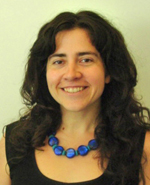Young Scientists Meet Heidelberg Laureates
November 8, 2013
Gwen Spencer ’05
Young researchers and scientific greats rarely rub elbows, but a Harvey Mudd alumna and current student did just that at the recent Heidelberg Laureate Forum in Heidelberg, Germany.
The forum brings together computer science and mathematics pioneers with a select group of 200 young researchers for a week of lectures and activities designed to inform and inspire the next generation of scientists.
The first Heidelberg Forum, held Sept. 22-27, featured 38 winners of mathematics and computer science’s highest honors—the Abel Prize, Fields Medal and Turing Award. Harvey Mudd College junior Tongjia Shi and alumna Gwen Spencer ’05 were among the 200 young researchers invited to attend.
“The Laureates’ talks were about much broader challenges than you hear about in many technical conferences. The desire to engage with and solve problems in other scientific fields was striking to me as a researcher who aims to do rich interdisciplinary work,” said Spencer, a Neukom Postdoctoral Fellow at Dartmouth College and 2005 Watson Fellowship recipient. “Great researchers can offer us more than their theorems; they can show us how to think bravely, creatively and aggressively about the paths forward.”
Speakers at the inaugural forum included computer scientist and Turing Award Laureate Raj Reddy, a pioneer in artificial intelligence, mathematician and Fields Medal Laureate Efim Zelmanov, known for his work in combinatorics, and mathematician and Abel Prize Laureate Endre Szemerédi, whose work has contributed to discrete mathematics and theoretical computer science.
“The talk I found most inspiring was ‘Desperately Needed Remedies for the Undebuggability of Large-Scale Floating-Point computations in Science and Engineering,’ by William Kahan, because I was able to see how a scientist detects problems and feels responsible for making changes,” said Shi, a joint math and computer science major, and recipient of the Harvey Mudd mathematic department’s RIF Prize and Robert James Prize. “I also liked Silvio Micali’s ‘Rational Proofs’ talk because it connected computer science with economics in areas of information theory.”
In addition to the talks, the forum’s design fostered inspiration by creating space for personal interaction between the Laureate speakers and the forum participants.
“The forum avoided placing the laureates on a distant pedestal; we chatted with them in coffee breaks, we ate dinner together and we toured historic sites as a group,” said Spencer. “The laureates have given our disciplines incredible gifts, but they remain human. So, we can imagine ourselves also as people who might make significant contributions.”
